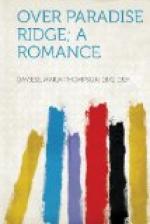“I’m going on with the doctor to those cows, Sam, and if you want to go with us, get in quick,” I answered, in a tone of voice I have used on Sam once or twice in our lives with great effect. He hopped in and I started at top speed.
“Hic-chew! Fine goer that,” wheezed the doctor, and I didn’t know whether he alluded to me or Redwheels. But there was evident relish of real pace in his voice, so I speeded up and shot away from the main road into the hard dirt lane in good style.
“I’m a bird—I’m a bird!” shouted the picked fledgling at my side as we whizzed under dark cedar boughs that waved funereal plumes over our heads, and over stumps and stones with utter disregard of the heavy new tires. One of the lessons I learned early is that men are timid of a woman’s driving them in any vehicle, and I was surprised that I at last rounded the bend and drew up beside a long, low shed which Sam had calmly pointed out to me, without having had a single remonstrance from the back seat.
“Moo,” came in a gentle, sad voice from the depths of the shed as we all began to disembark at the same time.
“Well, one is alive, anyway,” said Sam as he set Byrd on the ground and held up his arms to me. “It’s good to have you back, Betty,” he whispered, in an undertone, as he turned me against his shoulder to set me down. “It ’ll all go right now that you are here to—”
“Now tell us what to do, Doctor.” I interrupted him determinedly, because I felt that it was not the occasion for friendly sentimentalities.
If at any time in the three years that preceded that night I had foreseen the way I was to spend it I would have been justified in flatly refusing to carry out my horoscope. Suppose, for instance, while I was in the midst of the wonderful dinner Peter Vandyne’s cousin, Count Henri de Berssan, gave me in Brussels, a week before the storm broke that carried him before cannon and bayonet, I had seen a mental picture of myself six months from that minute, out in the woods on the side of a Harpeth hill under an old cedar-pole shed with my jacket off, my embroidered blouse sleeves rolled to the shoulder, filling a tin can, which had a long spout to be poked down a cow’s throat, with a vile, greasy mixture out of a black bottle, at the directions of a shirt-sleeved little man and a red-headed farmer in blue overalls, while a wisp of a boy writhed in and out and around and under a pathetic old Jersey cow, who was being rescued from the jaws of death. Now I wonder just what I would have done to escape such an experience? Slated myself for Belgian widowhood, perhaps, as a kinder fate, or stayed right there in New York to help Peter on “The Emergence.” I wonder if Peter ever saw a dear, big-eyed, trustful old Jersey cow have medicine poured down her throat. It is called “drenching.” I wish he could see it before he finishes that play. The sight produces a peculiar kind of emotion that might be worth recording




